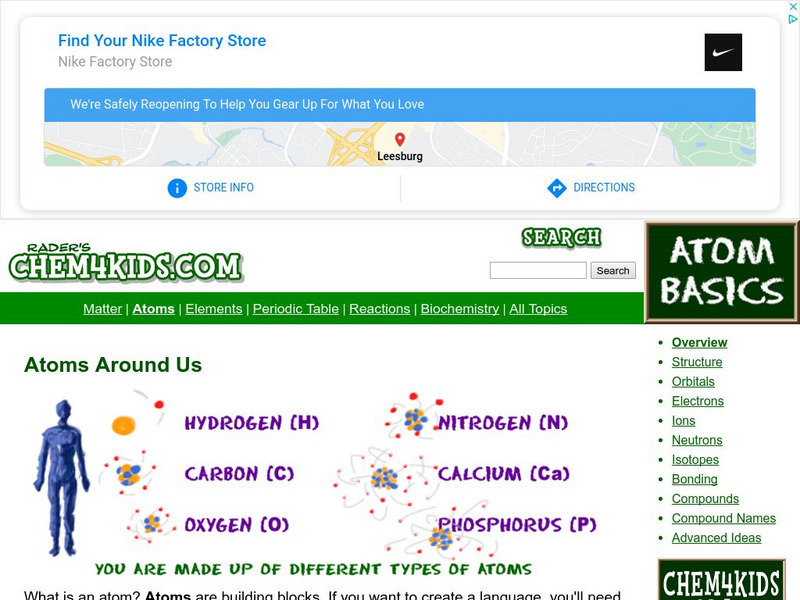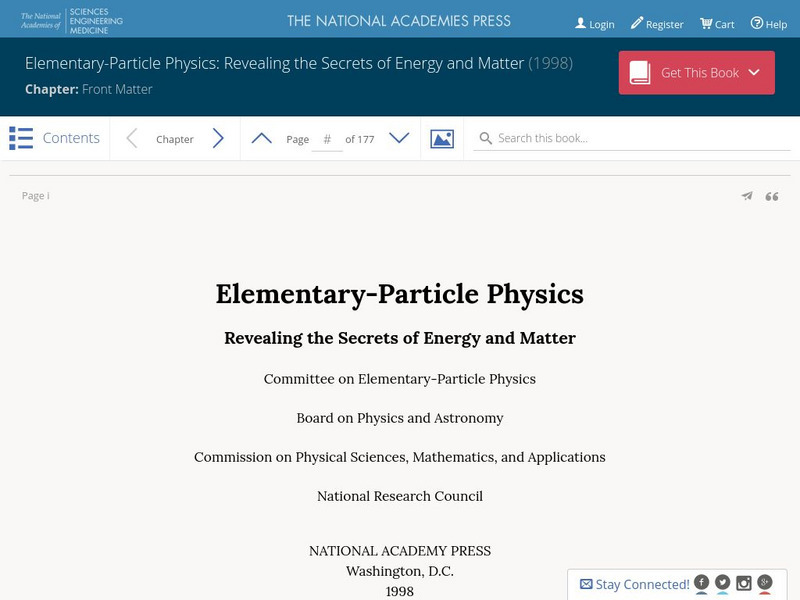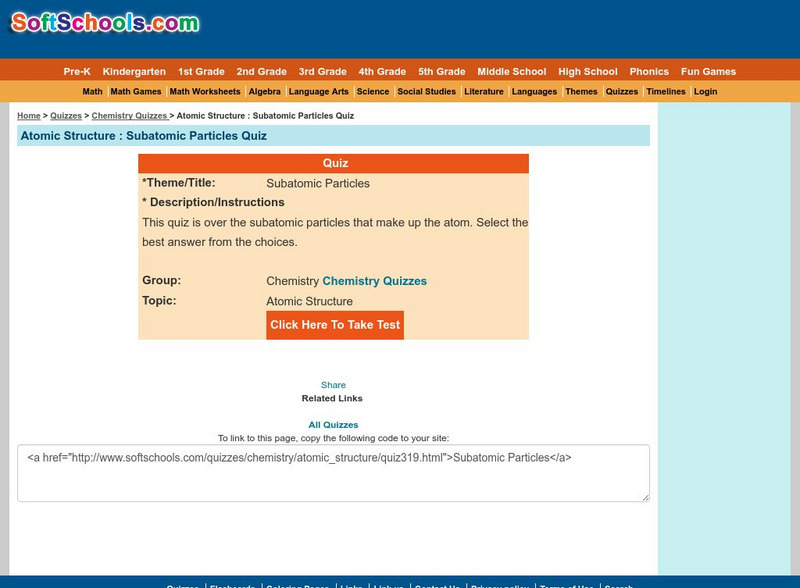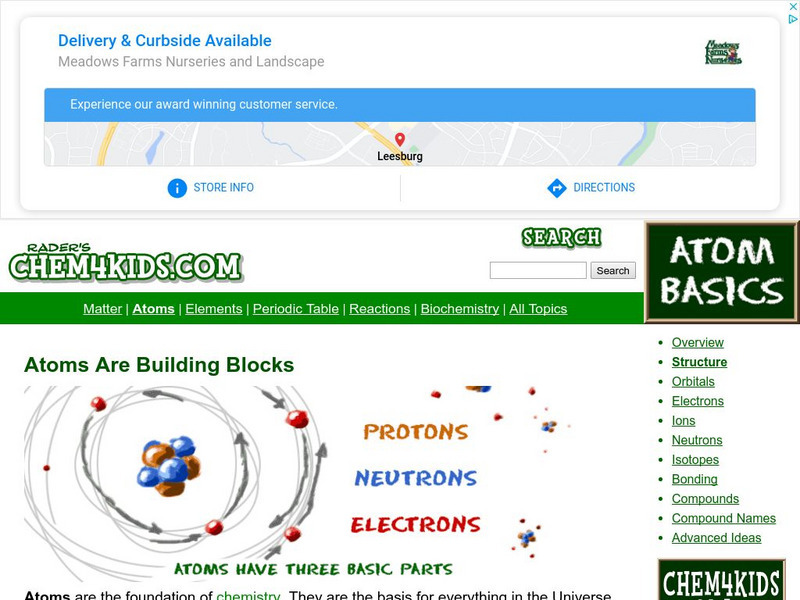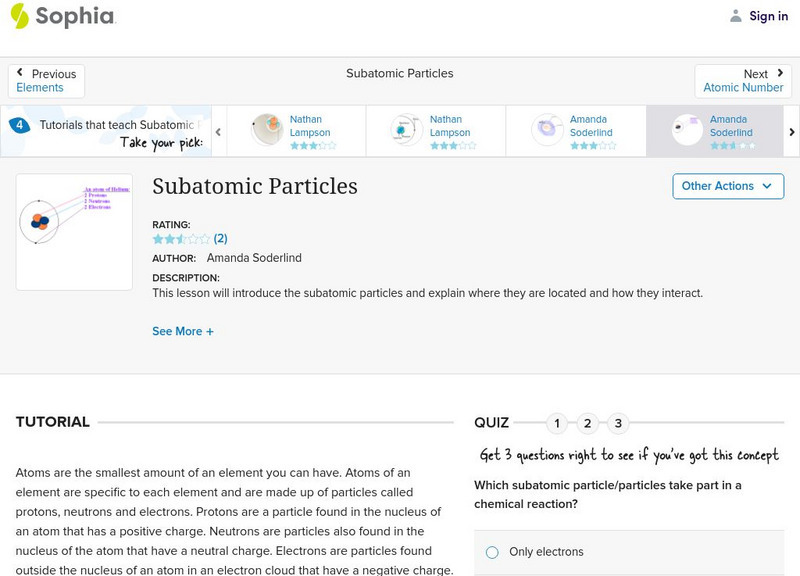Nobel Media AB
The Nobel Prize: The Nobel Prize in Physics 1935 Presentation Speech
The Nobel Physics Chairman made this speech when presenting the Prize to Chadwick. It clearly explains the importance and depth of Chadwick's work. Site by Nobel e-Museum.
Concord Consortium
Concord Consortium: How Does an Object Become Charged?
Activity 1 in this module: What is the effect of changing the composition of an atom? Since all atoms contain protons, neutrons, and electrons, what makes one element different from another is examined.
American Chemical Society
American Chemical Society: Hompage
ChemCenter, available from the American Chemical Society, provides chemistry news, reference sources and other public services.
Environmental Chemistry
Environmental chemistry.com: Anatomy of an Atom
Explains the basics of atomic structure, from simple definitions to information about quantum theory. Accurate and helpful basics whether or not you need the more advanced information.
Chem4kids
Chem4 Kids: Atoms
This site provides a detailed overview of atoms. Content explores an atom's structure, as well as what ions are, how atoms bond, what compounds are (including how to name compounds), and what isotopes are.
Department of Defense
Do Dea: Chemistry Review
Review atoms with this slideshow. You can choose to listen to the review or read the accompanying text. At the end, play the game to review the basics of atoms that you have just learned about. You may play the game as many times as...
PBS
Pbs Learning Media: Atomic Structure
Take a look at the parts of an atom and learn about its properties.
Wikimedia
Wikipedia: Materia
Explore the concept of matter in this Spanish-language encyclopedia entry. This site features the properties of matter, the Law of Conservation of Matter, and other important features of matter.
Other
National Research Council: Elementary Particle Physics
The Committee on Elementary-Particle Physics, part of the U.S. National Research Council, presents this massive report on particle physics. It's a definitive document. Surprisingly readable, totally detailed. Start with the Table of...
CK-12 Foundation
Ck 12: Chemistry: Atomic Nucleus
[Free Registration/Login may be required to access all resource tools.] Describes the modern concept of the atomic nucleus.
Soft Schools
Soft Schools: Subatomic Particles Quiz
Take this interactive, multiple-choice quiz over subatomic particles, then review your score and any missed questions at the end.
Science Struck
Science Struck: How Does Radioactive Decay Work?
Explains the processes of radioactive decay in primary and secondary modes.
Encyclopedia Britannica
Encyclopedia Britannica: Hydrogen Ion
This brief entry describes the hydrogen ion, strictly, as the nucleus of a hydrogen atom separated from its accompanying electron. The hydrogen nucleus is made up of a particle carrying a unit positive electric charge, called a proton.
Museum of Science
The Atoms Family: Spectroscope of an Atom
"The Phantom has provided you with a simulated spectroscopy of an Atom! Amuse the Phantom by observing the spectroscope and you'll learn more about the Atom." Observe and review the structure of the atom.
Quia
Quia: Chemical Bonds (Ionic and Covalent) Quiz
This is 21-question multiple choice quiz over chemical bonds was written for a 7th-grade science class.
Chem4kids
Chem4 Kids: Atoms Are Building Blocks
Identify the basic structure of atoms, the building blocks for all matter.
Physics Classroom
The Physics Classroom: Static Electricity: Neutral vs. Charged Objects
With this interactive tutorial, students explore the basic terminology and concepts of neutral and charged objects.
Khan Academy
Khan Academy: Charge Transfer Processes
In this 4-question quiz, predict how charge gets transferred by conduction between two objects.
Thomas Jefferson National Accelerator Facility
Jefferson Lab: Beta Decay
This site from Jefferson Lab provides a description of beta decay along with two helpful formula examples. Several links are provided throughout this page for additional information on related subjects.
New York University
New York University: Law of Conservation of Energy
Site presents a straightforward presentation of Rutherford's work concerning the Law of Energy Conservation. Provides an adequate summary of early science on the nucleus, and includes much needed illustrations.
Sophia Learning
Sophia: Subatomic Particles: Lesson 3
This lesson will introduce the subatomic particles and explain where they are located and how they interact. It is 3 of 7 in the series titled "Subatomic Particles."
Sophia Learning
Sophia: Subatomic Particles: Lesson 4
This lesson will introduce the subatomic particles and explain where they are located and how they interact. It is 4 of 7 in the series titled "Subatomic Particles."
Sophia Learning
Sophia: Subatomic Particles: Lesson 6
This lesson will introduce the subatomic particles and explain where they are located and how they interact. It is 6 of 7 in the series titled "Subatomic Particles."
Sophia Learning
Sophia: Subatomic Particles: Lesson 7
This lesson will introduce the subatomic particles and explain where they are located and how they interact. It is 7 of 7 in the series titled "Subatomic Particles."
Other popular searches
- Protons Neutrons Electrons
- Protons, Neutrons, Electrons
- Protons, Neutron, Electrons
- Protons, Electrons, Neutrons
- Protons and Electrons
- Protons Neutrons, Electrons
- Atoms Electrons Protons
- Protons Electrons
- Protons Neutron Electrons
- Protons Electrons Crossword
- Neutrons, Electrons, Protons





